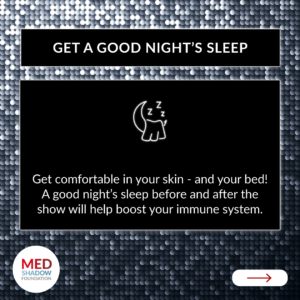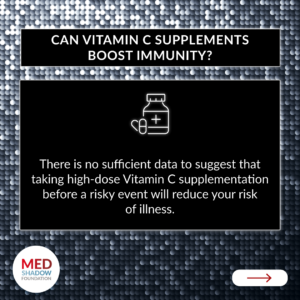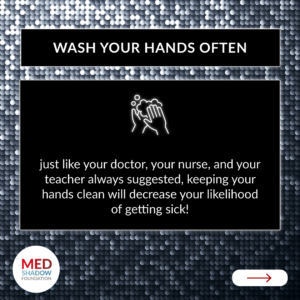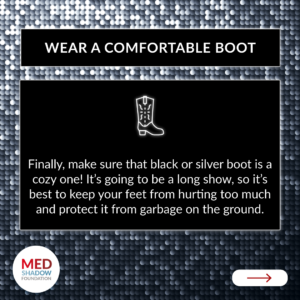It’s happened to most of us. You’re there for a good time, but end up taking an unwanted “souvenir” home with you. Unfortunately large gatherings these day seem to often come with an illness. If you want to learn how to not get sick at concerts, festivals, or massive gatherings, read on!
After attending the Renaissance concert in Atlanta and ending the night in a crowded pizza parlor, Tyler Seeger says he came down with a cold so intense that he had to take a week off from his normal work and activities. Two days after the concert, he says, “I started running a fever, plus muscle pains made me stay in bed the whole day. I talked to my friends, and 7 out of the group of 8 were feeling similar symptoms.”
He says he’s always felt as though he got sick easily, but that week was a wake up call. Since then, he’s made adjustments to his diet and started taking supplements in hopes of strengthening his immune system.
The COVID-19 pandemic has made some of us more aware of the risks we take when entering a crowded space, but if you’ve felt a buzz from the concert’s blaring bass transition into a buzz from excess sinus congestion and phlegm, you know that all kinds of infections spread quickly in crowds. Here’s what you can do to lower your risk of getting sick.
Before the Event
“The best way to support immunity in general is to consistently practice healthy habits like eating a varied, anti-inflammatory diet such as the Mediterranean, incorporate exercise, manage stress, get good sleep, and wash hands frequently with soap and water!” says Alison Acerra, MS, RDN, Registered Dietician with MedShadow’s Medical Advisory Board. Download MedShadow’s Mediterranean Diet Guide to get started.
Get a Good Night’s Sleep

Your body needs sleep in order to fight off infections. While you’re dreaming, your immune system revs up and produces important cells and proteins that help your immune system fight off pathogens. If you don’t sleep for 24 hours, you won’t make as many of these important cells. That leaves you vulnerable to infection.
Eat Well
Our immune systems are complicated, and in order to keep this well-lubricated machine running efficiently, we need adequate levels of a variety of nutrients such as vitamin C, vitamin D, vitamin A, zinc, iron, and protein. The best way to make sure your immune system has the fuel it needs to protect you is to maintain a varied and healthful diet. Acerra recommends the Mediterranean diet, which is full of fruits, vegetables, whole grains, lean meats, and healthy fats.
Vaccines
Vaccines are one of the most effective ways to reduce your risk of illness and improve outcomes if you do get the illness. While there are many vaccines you’ll only need to get once in your lifetime as a child or adolescent, there are others that are only available to older adults or those who have certain conditions that put them at high risk for infection (such as the shingles and pneumococcal vaccines) or others that are most effective if you get them each season, such as the flu, pneumonia, and COVID vaccines.
Nathan Russo, says that when he was in his early 20s, he went to an NBA game and went out with “the worst sickness I ever got.” It was the flu, and it knocked him out for a week. Since then, he says, he’s consistently gotten his annual flu shot to avoid repeating the experience.
Additional MedShadow Resources About Vaccines for Common Infections can be found here:
Can Taking Vitamin C Boost Immunity?

Several readers told MedShadow that they take vitamin C and other immune-boosting supplements such as Emergen-C (which includes vitamin C among other nutrients thought to support your immune system).
However, Acerra says, “There isn’t really any sufficient data to suggest that taking high dose Vitamin C supplementation before a risky event will reduce risk of illness.”
She added that “Vitamin C is definitely a vital nutrient for immunity, but it more likely works synergistically with other nutrients and antioxidants that can overall support immune defenses.”
During the Event
Once you arrive, there’s still plenty you can do to protect yourself from infections.
Keep Your Distance
When we’re infected, we expel germs every time we cough, sneeze, or even breathe. The distances these germ-laden particles travel varies widely based on the germs they’re carrying, the temperature, humidity, ventilation, wind, and more. During the pandemic, many of us got used to maintaining six feet of distance between ourselves and others. This is a good rule of thumb, but it’s not a guarantee. The farther you are apart from others, the less likely you are to breathe in pathogens.
Another good strategy is gathering outdoors. Here, germs are diluted by ample fresh air, which also reduces your risk.
Wash Your Hands

Floating through the air isn’t the only way that germs spread. Some pathogens can live on surfaces like countertops and doorknobs for hours or even days. If you touch one of those, then touch your face, you could be giving germs a free ride into your body.
Avoid touching these surfaces when you can. When you can’t avoid it, wash your hands regularly with soap and water or consider carrying small containers of hand sanitizer with you and use regularly.
“I am a business owner and really don’t want to have to take time off work,” says Jeremy Yamaguchi, “When I’m at the event, I try to keep my hands as clean as possible – washing them whenever possible, sometimes bringing my own hand sanitizer.”
You might also consider carrying a travel-sized lotion if frequent hand hygiene leaves you with dry, cracked skin.
Consider a Mask
“I already give first bumps instead of handshakes to limit the contact between myself and others,” says James Green, but after he got sick after a recent business conference, he now wears masks whenever he’s in crowded places.
Green isn’t alone. Kyle MacDonald, says he now keeps a pack of masks in his car at all times, in case he happens to “stumble into another crowded event.”
Masks can prevent at least some germs, allergens, and irritating particles (like the ones in wildfire smoke) from finding their way into your lungs.
Wear Good Shoes

If you’re at an outdoor event, such as a music festival, you also need to protect your feet. Dan Morris who lost his flip flops during a music festival in Australia. At some point, he also got a cut on his foot.
“The ground was littered with all sorts of garbage,” he says, but he wasn’t too worried about it. Everyone around him was wearing flip flops as well. About two days later, the cut was infected.
“From then on, I’ve always worn shoes to music festivals and outdoor concerts,” he adds.
What to Know About Cold and Flu Medicines if You Do Get Sick
Cold and Flu Medications
Many cold and flu products take a scattershot approach. For example, Vicks NyQuil Severe Cold & Flu Relief contains acetaminophen to treat aches and fever, dextromethorphan for coughs, phenylephrine for congestion, and doxylamine to help you sleep.
When you feel lousy all over, such products can be tempting to take. But, safety-wise, it’s better to stick to single-ingredient products as much as possible. Why? Because the more drugs included in a product, the greater the risk of side effects.
Even if you stick to single-drug medications such as Tylenol (acetaminophen) or NSAIDs (non-steroidal antiinflammatory drugs), be sure you watch how much you’re taking. Ingesting more than the recommended doses can damage your liver and digestive system.
Decongestants
If you’re congested, decongestants, such as Mucinex, work by breaking up mucus to clear your airways. However, if used for more than three days, you may notice a rebound effect, in which your congestion worsens. Some decongestants can raise blood pressure or cause insomnia, heartbeat abnormalities, tremors, anxiety, and hallucinations.
Antibiotics
The flu, COVID, and common cold are all caused by viruses rather than bacteria, so typically you won’t need antibiotics for these. You may need them for other infections such as strep throat. However, sometimes when your immune system is busy fighting off a virus, a bacteria sneaks in as a secondary infection. If your symptoms worsen after several days, contact your healthcare provider.
Learn more about over-the-counter drugs—and alternatives—for common cold and flu symptoms here.
It can be harder than it looks to choose the right over-the-counter medication for your symptoms. Read about MedShadow Foundation founder Suzanne Robotti’s experience.
Steroids
Sometimes doctors will prescribe corticosteroids such as prednisone to help alleviate pain and swelling associated with bacterial or viral infections.
Learn more about the different types of corticosteroids and their side effects here.






